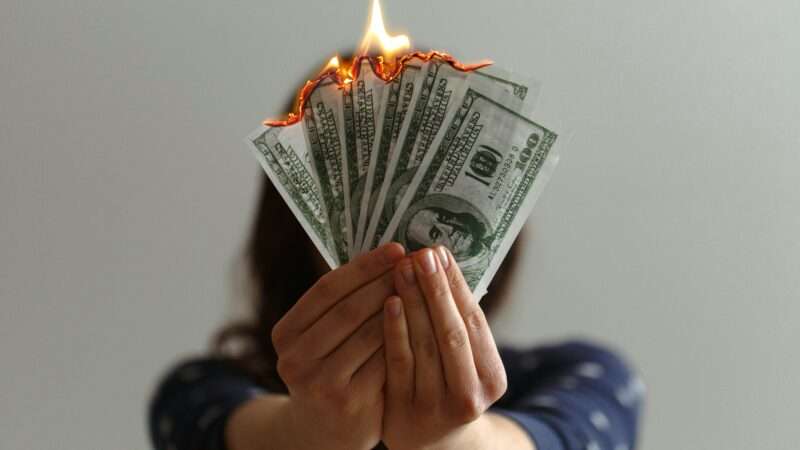
In retrospect, the most important incident along the road to this Election Day may not have been the Democratic Party's decision to shove aside President Joe Biden, or the unprecedented (and undemocratic) elevation of Vice President Kamala Harris to the top of the ticket. It wasn't the Republican Party's inability to break out of the thrall that Donald Trump holds over it, or the two assassination attempts aimed at him.
The thing that most shaped this election happened long before all that. It was a decision made in the early days of the Biden administration. With the last election barely in the rearview window, Biden pushed a major stimulus bill through Congress—a bill that spent $1.9 trillion, nearly all of it borrowed—despite warning signs that the already recovering economy might not be able to handle the full-throttle infusion of more dollars.
"Now is the time for big, bold action to change the course of the pandemic and begin economic recovery," Biden promised. Bloomberg termed it a "big bet on run-it-hot economics," and noted that the White House had "shrugged off warnings that the economy may overheat as a result."
It was a wager that didn't pay off the way the White House had hoped.
A year later, inflation had surged to over 9 percent, its highest level in 40 years. As I've written before, that fact undersells the historical context: Before 2021, the last full year in which America experienced an average inflation rate of more than 4 percent was 1991. There was only a single year (2008) from then through 2020 when the annual inflation rate exceeded 3 percent. In other words, peak inflation in the first half of 2022 was two to three times worse than the worst bout of inflation that most Americans could easily recall.
For those of us who follow political and economic news for a living—or even as a serious hobby—all of this probably feels like, well, old news. Prices have been rising at a much more normal pace for the past year or more. In September, the annualized inflation rate was 2.4 percent. Higher than the prepandemic norm, but nothing that should cause an electoral freak-out.
But the average voter isn't a political or economics junkie, and much of America sees 2024 as the inflation election: a referendum on the federal policies that caused that brief and horrific surge in prices. (That causation is well established by now: A study by the St. Louis Federal Reserve found that "domestic stimulus" played a "sizable role" in driving inflation to 40-year highs.)
An Ipsos poll in August found that 50 percent of voters said inflation was their top concern heading into the election. In October, Gallup found that 90 percent of voters rated "the economy" as being "extremely important" or "very important" to their vote—the highest it has scored since the 2008 election in the depths of the mortgage crisis. Polling guru Nate Silver crunched the numbers further and found a stunning correlation: "Each additional $100 of inflation in a state since January 2021 predicts a further 1.6 swing against Harris in our polling average vs. the Biden-Trump margin in 2020," he posted on X last week.
It's been impossible for the Biden-and-then-Harris ticket to escape the inflation issue for two reasons. First, Harris has been unwilling or unable to distance herself from the Biden administration. And, second, because the Biden White House made economic policy so central to its message for three years—even coming up with the counterproductive "Bidenomics" slogan.
"Bidenomics was, at heart, a philosophy of throwing money at programs, people, political allies, and favored constituencies. That spending contributed directly and significantly to the rapid rise in inflation that helped fuel voter dissatisfaction with the state of affairs," Reason's Peter Suderman summarized in a March 2024 cover story. "Thanks to misallocation, poor implementation, and self-contradictory regulatory requirements, the substantive public payoffs to that spending have been weak at best and counterproductive at worst."
Of course, there are logical counterpoints to the feelings voters have about inflation ahead of Election Day. For example, wages have gone up faster than prices. Moody's estimates that the average American household is now spending $1,120 more per month to buy the same goods and services as in January 2021, but is also earning $1,192 more per month. Some products have even defied inflation: Plane tickets are cheaper now than they were before the pandemic, as liberal commentator Matt Yglesias pointed out this week.
It's also true that former President Donald Trump's economic agenda seems likely to cause prices to rise. Mass deportations and huge new tariffs will cause all sorts of economic disruptions and will make Americans poorer. It seems bizarre that voters seeking a stable economy after the past four years would put their trust in an erratic populist, but if this election season has proven anything, it's that humans get pretty irrational about inflation. In part, that's because our brains attribute economic gains to our own accomplishments but look for someone (or something) else to blame when things go the other way. In other words, your paycheck got fatter because you worked harder, but your groceries got more expensive because Biden (or the big corporations) are out to get you.
Of course, that's not true—both things happened for the same reason—but inflation breaks our brains and Election Day is not a time for deep thinking about political science or psychology. Elections are decided by how people feel, and lots of Americans still feel pretty grumpy about how much it costs to go to the grocery store these days. It's really that simple.
The post The Inflation Election appeared first on Reason.com.







